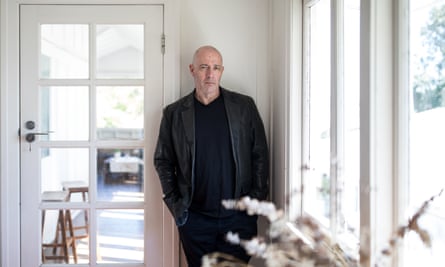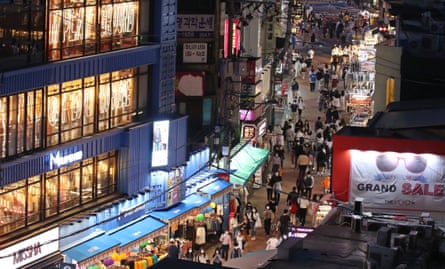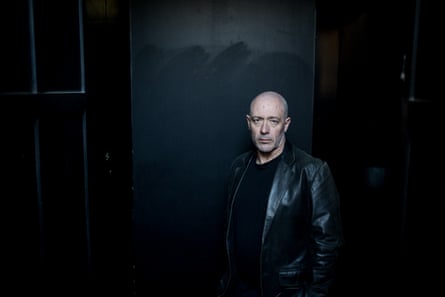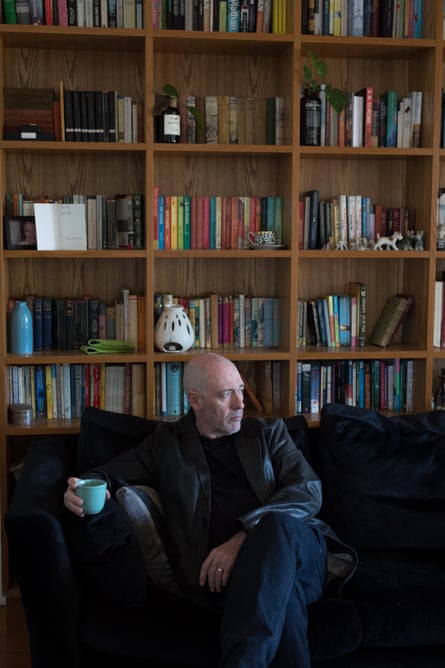Extract from The Guardian

For one brief shining moment it seemed humanity’s inability to imagine much beyond our lived experience was irrelevant. Covid was coming for us all
- This is part of a series of essays by Australian writers responding to the challenges of 2020
The chicken shack was nearly an hour’s walk through Seoul in the subzero night, but they served up damn good chicken, and dangerously cheap beer, and we agreed the risk of becoming lost and freezing to death on the street was worth it. My son, Thomas, spent his early years in Canberra, and he does not feel the cold like I do, routinely sleeping with his bedroom windows wide open through the winter. But on this night even he swaddled up with multiple layers of hoodies, scarves and so much Korean puffer-wear that we were less men than giant, shambling marshmallows in search of the dirty bird.
There was, as well, a quiet pleasure to be had from the killing cold. When we had flown out of Australia a few days earlier the whole of the sky was smeared a smoky orange ochre, and the familiar steam press humidity of summer in the subtropics had evaporated under a furnace blast of dry heat from the heart of the continent. It felt good to shiver and contemplate the lot of everyone we’d left behind, especially as we drummed greasy fingertips on painfully distended tummies full of spicy chicken meat. But enjoyment would pass.
We were nearly two weeks in Seoul and, by the time we made our last pilgrimage to the chicken joint, unimaginably vast expanses of Australian bushland and even rainforest had not just burned but been atomised inside a conflagration burning at planetary scale. My long habit when travelling overseas of never reading Australian news came to nothing, because the firestorm at home was headline news all over the world. A giant video wall across the street from our hotel, two or three storeys high, pulsed with apocalyptic visions of rich, white refugees hip deep in the ocean, having fled the black tsunami of ash, smoke and flame. International news sites refreshed constant updates from the fire front, and from the eerily deserted streets of Sydney and Melbourne. Scientists estimated the number of native animals killed to be in the millions, then hundreds of millions. Then more than a billion.
This
was horror painted on a vast, burning canvas. But worse were the
smaller, more intimate stories of fireys and farmers who, having heard
the dying screams of burning koalas, could never unhear them.
And through it all the prime minister was inexplicably missing in action, until it turned out he was actually just missing in Hawaii.
Watching from Seoul, seven and a half thousand kilometres away, it seemed to me that it could not go on. Something would have to give.
But it would, of course, go on for months.
To be so far away during those days of the summer holocaust was distancing in more than one way. At night, sitting in the bar in my hotel, staring out over the Blade Runner landscape of Seoul’s Hongdae district, I could doom-scroll Twitter for apocalyptic visions of hellfire consuming Australia. Sometimes I could glance down 19 storeys to see the same images on those giant screens just above street level, where they competed for eyeballs against the pixel storms of StarCraft and Counter-Strike competitions from the gaming cafe across the street, or the even more surreal imagery of the giant animated cartoon mascots that are ubiquitous in Korea. Australia’s horror was abstracted away, made alien and rendered into meaningless colour and movement.
If this seems harsh, I can only offer my congratulations. You have reacquired your sense of privilege.
How
many famines in Africa, ground wars in Asia or catastrophic oil spills
in the Gulf of Mexico have you contemplated from afar without suffering
visceral connection? You may have felt something akin to sympathy, but
more likely you were processing the idea of sympathy because the words
or images which carried the knowledge of those terrible events to you
seemed to come freighted with a moral imperative that you care about
them.
At least until you scrolled away, went out for coffee, or realised that Netflix had dropped the next season of your favourite show and it was time to get your binge on.
I remember feeling very strongly as I watched Australia burn from Seoul and Hong Kong and, months later, from Rome and Milan and Paris that we were the Other now. Our turn had come. And while the world might gin up some long-range empathy for the plight of a dying koala or baby kangaroo, we the peeps were probably shit out of luck. Just like those poor bastards we exiled to our Pacific gulags, who drew the shortest straw when their fates became dependent on our generosity of spirit. Or the Eora people, whose long watch over the southern shores of Botany Bay was closed out by Arthur Phillip’s order to a young Watkin Tench to lead a punitive raid against the tribe to spread “an exemplary terror among the natives”.
Sometimes your luck just runs out, and a hard truth of human nature is that we really only care about what’s close. White Australia was a lucky country for so long, because the gift of distance was history’s lack of interest in our affairs. But that absence of concern for a tiny outpost, removed from the centre of things, can just as easily turn to indifference and genuine disdain when fate turn against us. From afar it was possible to see with the cold objectivity of foreigners just how unflattering a picture we made for any who cared to look. An immensely privileged dominion occupied by a small number of deeply selfish people, suddenly confronted with the consequences of inaction.
For a few months there you could finally see the world accelerating towards the existential discontinuity of irreversible, devastating climate change. No more projections. No theories. No modelling or arcane math. The future had arrived. It was not evenly distributed. It had exploded into the real on the eastern edge of the Australian continent.
Meanwhile, sitting on a beach in Hawaii was our doughy, aggressively know-nothing prime minister, infamous for carrying a big lump of coal on to the floor of parliament and fondling the same with the puckish joy of a man-sized Billy Bunter in possession of a large, unexpected jam donut. To the beach he went, while his land and his people hurtled towards the burning pit.
Perhaps, sipping umbrellas drinks and mugging for happy snaps with similarly footloose bogans, Scott Morrison was himself subject to the distancing effect I felt all around me in South Korea and Hong Kong, that deeply human flaw that the gaming journalist and Twitter savant David Milner describes as the inability to conceive as real any reality different to our own lived experience. Hong Kong in particular afforded a novel perspective on the subject-object divide, as smoke from nearby pro-democracy riots drifted into the bar where we sat watching smoke from a series of megafires blanket the streets of Sydney.
The drinkers of Hong Kong’s Mid-Levels district seemed no more inconvenienced by the actual particulates contaminating their imported beers than they were by hi-def imagery of incinerated biomass contaminating the city where some of that beer had originated. The riots that weekend were a few miles away. The megafires another world.
But of course otherness is an illusion; comforting, anaesthetising, but illusion nonetheless.
By that time, 80% of Hong Kong’s population had been teargassed at some point in the previous six months, and every day drew them closer to the end of the city’s freedom, many years ahead of the prescribed return to complete control by the mainland.
It is perhaps
a passing irony of 2020, the year of metastasising ironies, that
Beijing’s grip on its recalcitrant entrepôt should have been
strengthened by the emergence of the novel coronavirus from the wet
markets of Wuhan. But nobody said the end times would be boring and, if
there is subtext to this year of lethal wonders, it cautions against
narrative complacency. I had assumed a thousand years ago in February
that a world with its own sorrows to attend to would eventually tire of
ours, even while the bush burned and the reef turned white and died.
But a funny thing happened on the way to the apocalypse, and that congenital flaw of the human heart and mind, our inability to connect intimate subject to distant object, would be undone.
By distancing.
The virus may yet kill us all, one way or another, but having killed at least half a million human beings at the time of writing, having emptied the streets of Rome and the tall towers of Manhattan, it scattered us like chaff before the tempest – or like aerosolised droplets of infected sputum, should you prefer a more clinically befitting metaphor. To our varied holes we bolted, those of us who could, leaving behind those who couldn’t because they did not have the means to flee and we still needed them to drive trucks, stack shelves, flip burgers and remind us of a simple truth, that heroism is often average people doing normal things when everything else is falling apart.
But in that falling apart, for a little while at least, it felt like we were all together.
Racism, selfishness and moments of mad panic flared up here and there, and often all at once in the toilet paper aisle at the local supermarket, but as the human race contemplated our shared mortality it did seem, for one brief shining moment, that our inability to imagine much beyond our lived experience was suddenly irrelevant because everyone’s lived experience was now the same. The virus was coming for us.
Of course, we have moved on from that. Politics in particular abhors a vacuum and has rushed back into the space cleared by Covid-19. That’s not completely unreasonable. In the US, which lurches closer to catastrophic failure every hour the tangerine Chimpenführer sits the throne, only politics can save them from something much worse. Here, the working truce between state and federal governments and the major parties must inevitably fracture when we turn to the forever question of who is going to pay for everything. (Spoiler: it won’t be the rich.) And in the Hobbesian realm of geostrategy, the uncertainties and instabilities occasioned by the pandemic can only increase those deep, tectonic pressures running along the fault lines between civilisations. This would have happened whether China bungled its initial response to the virus or not.
But home again, exiled to my pleasant writing room with the nice view over the remnant forest that runs down to the river, I can only wonder, what next.
The weather in Siberia is ominous.
Months of extreme heat have baked the Russian Arctic and thawed gigatonns of permafrost. The frozen tundra warms even as the coronavirus spreads. They are, for now, unrelated but coincident planetary comorbidities. Warm weather is not unheard of in the Arctic. Summer days are long up there, allowing for a lot of solar energy to hit the ice caps. As the underlying seasonal temperatures creep up, however, those occasional heatwaves will add their thermal power to a much higher baseline.
And now 12m acres of Russia’s coldest wastelands are on fire.
They burn while we distract ourselves with contention over other things. They burn while you read this. They will burn tomorrow when you have found some new distraction. Eventually, we can but hope, winter will return and they will stop burning, but by then our turn will have come around again, and the Arctic Circle will be just that little bit less arctic.
What ancient viruses slumber in those cold sediments, waiting for a flicker of warmth to loose them into the world again, or lurk in the Amazon, or the jungles of West Africa, needful only of the woodsman’s axe to carve a path to freedom?
Reducing everything to dualism is another of our faults but this does seem to be a binary moment. Either we are all in this together or we are doomed to return to a state of nature, the never-ending war of all against all. It was Prospero at the end of The Tempest who warned us against illusions and otherness, lest we see dissolved our “cloud-capped towers, the gorgeous palaces, the solemn temples and the great globe itself”. I fear, I really do fear, that either we heed the old sorcerer, or, as he further warned, we shall “leave not a rack behind”.
• This essay will be part of the anthology Fire, Flood and Plague, edited by Sophie Cunningham and published by Penguin Random House in December

No comments:
Post a Comment